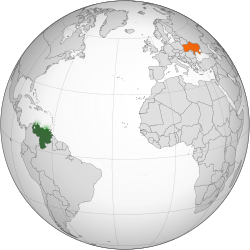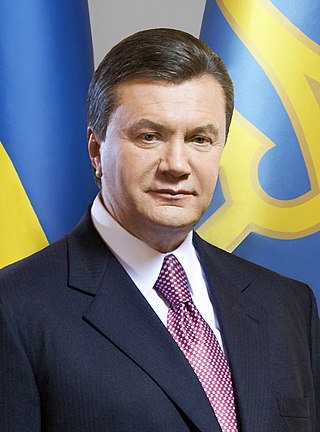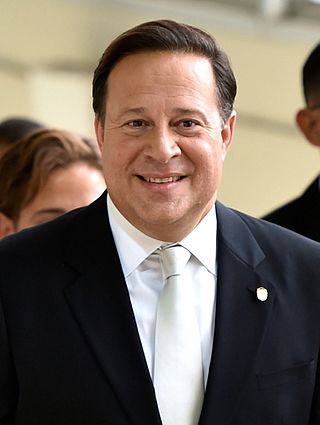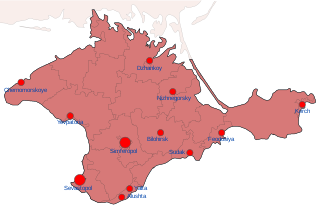 | |
Venezuela | Ukraine |
|---|---|
Relations between Ukraine and Venezuela were established on 9 January 1992 with the recognition of Ukraine's independence by Venezuela. Both countries have no embassies in the respective other country.
 | |
Venezuela | Ukraine |
|---|---|
Relations between Ukraine and Venezuela were established on 9 January 1992 with the recognition of Ukraine's independence by Venezuela. Both countries have no embassies in the respective other country.
On 9 January 1992, Venezuela recognized Ukraine's independence.[ citation needed ]
In April 1999, the Minister for Foreign Affairs of Ukraine Borys Tarasyuk paid his first official visit to Venezuela. There, he said that Latin America is not a "terra incognita" for Ukrainian foreign policy. Tarasyuk argued that the region is an important market for Ukrainian products and that Ukraine should actively develop contacts with Latin American countries. [1]
In September 2010, the Venezuelan vice foreign minister Temir Porras Ponceleon visited Deputy Minister of Foreign Affairs of Ukraine Oleksandr Horin and they discussed a "wide range of issues of Ukrainian-Venezuelan cooperation in political, trade and economic and humanitarian spheres". [2]
In October 2010, Venezuelan president Hugo Chávez met with then-Ukrainian president Viktor Yanukovych in Kyiv. The Ukrainian head of state said that "a lot of time has been lost between our two countries" and further noted that the world "can expect a deepening of cooperation" between both of the countries. [3] [4] Chávez visited the Antonov plant in Kyiv and agreed with Yanukovych on establishing embassies of each country in the other country. Both head of states signed agreements regarding the Odesa–Brody pipeline. [5]
As agreed during the Kyiv visit, the Ukrainian Foreign minister Kostyantyn Gryshchenko paid an official visit to Venezuela in December 2010. The delegation included representatives of ministries, governmental agencies and leading companies of Ukraine, interested in development of cooperation with Venezuela. [6]
On 7 March 2014, the Venezuelan Foreign Ministry released a statement which said President Nicolás Maduro "condemns the coup perpetrated by extremist groups in Ukraine following an attrition strategy promoted from abroad by the government of the United States and its NATO allies." It further stated, "the installation in Kyiv of de facto authorities not only threatens Ukraine's national unity, but the stability of the entire region as it places in danger Ukrainian citizens of Russian origin and the Russian Federation's own sovereignty." [7] [8] Venezuela did not recognize the secession and subsequent accession of Crimea to the Russian Federation. Nevertheless, Venezuela was one of the eleven countries that voted against the United Nations General Assembly Resolution 68/262, approved on 27 March, recognized Crimea as part of Ukraine and rejected the referendum on the political status. [9] [10] Although Venezuela did later recognize the annexation. In late 2014, Oleg Tsaryov, then the speaker of the Parliament of Novorossiya (a confederation that included the Donetsk and Luhansk People's Republic), appealed to Venezuela to recognize the independence of the two separatist republics. [11]
Ukraine rejected the results of the 2018 Venezuelan presidential election, where Nicolás Maduro was declared the winner.[ citation needed ]
In 2019, during the Venezuelan presidential crisis, Ukraine recognized Juan Guaidó as president of Venezuela. [12]
In early 2022, the Venezuelan government blamed NATO and the United States for the Russian invasion of Ukraine, stating that they had violated the Minsk agreements. Nicolás Maduro said before the invasion was launched that Venezuela was with Putin, but also urged a diplomatic dialogue to avoid escalating the conflict. [13] [14] José David Chaparro, who served as Venezuela's chargé d'affaires in Moscow between 2001 and 2005 and settled in Kyiv in the early 90s, enlisted in Ukraine's Territorial Defense Forces in the second day of the invasion along with his wife and became the commander of a division of Ukrainian volunteers. Chaparro's unit has helped donating food, water, commodities and fuel to civilians affected by Russian bombings. [15] [16]
Currently, trade relations between both countries are minimal. In 2020, Ukraine exported goods worth 4.68 million US dollars to Venezuela, mostly seed oils, wheat flours and petroleum. The same year, Venezuela exported goods worth 541,000 $ to Ukraine, mostly processed crustaceans, hard liquor and electric furnaces. [17]

Viktor Fedorovych Yanukovych is a former Ukrainian politician who served as the fourth president of Ukraine from 2010 to 2014. He also served as the prime minister of Ukraine several times between 2002 and 2007 and was a member of the Verkhovna Rada from 2006 to 2010. A member of the pro-Russian Party of Regions, Yanukovych provoked mass protests — the Euromaidan — against his rejection of closer integration with the EU and was removed from the presidency by the Ukrainian parliament in 2014, at the time neighboring Russia started to annex Ukrainian Crimea and started the Russo-Ukrainian War. Since then, he has lived in exile in Russia.

Nicolás Maduro Moros is a Venezuelan politician and the president of Venezuela since 2013.

Iran–Venezuela relations have strengthened substantially in recent years. "Iran and Venezuela are two friendly and united states which pave their ways to further progress and welfare for their nations", according to President Rouhani. The two countries are contemporary strategic allies of the Russian Federation and the People's Republic of China while opposing U.S. hegemony in their respective regions.

Diplomatic relations between the Argentine Republic and Ukraine have existed for decades. The importance of relations centers on the history of Ukrainian migration to Argentina. Ukrainians in Argentina form the second largest Ukrainian community in Latin America numbering approximately 250,000 Ukrainians and their descendants.

Serbia–Ukraine relations are foreign relations between Serbia and Ukraine. Serbia, as a direct successor to the Federal Republic of Yugoslavia, recognized Ukraine on 15 April 1994. Diplomatic relations between Ukraine and the Federal Republic of Yugoslavia were established on 15 April 1994.

Russia–Venezuela relations include cooperation between Russia and Venezuela in areas of common concern, such as their common status as oil exporters, and policy toward the United States. Venezuela is Russia's most important trading and military ally in Latin America. Russia recognizes Nicolás Maduro as the president of Venezuela, instead of Juan Guaidó, in the Venezuelan presidential crisis.

The Embassy of Ukraine in Moscow was the chief diplomatic mission of Ukraine in the Russian Federation. It was located at 18 Leontyevsky Lane in Moscow.

Kazakhstan–Ukraine relations are foreign relations between Kazakhstan and Ukraine. Before 1918, both countries were part of the Russian Empire and until 1991 they were part of the USSR. Both countries established diplomatic relations in 1991. Kazakhstan has an embassy in Kyiv and an honorary consulate in Odesa. Ukraine has an embassy in Astana and a consulate-general in Almaty. There are between 895,000 and 2,400,000 ethnic Ukrainians living in Kazakhstan. Both countries are full members of TRACECA, of the Baku Initiative, of the Euro-Atlantic Partnership Council, Partnership for Peace and of the Organization for Security and Co-operation in Europe. They are only 468 kilometres (291 mi) apart at their closest points.

Brazil and Ukraine are strategic partners and cooperate in trade, space technology, education, energy, healthcare, and defense. Brazil recognized Ukraine's independence on December 26, 1991, and bilateral relations were established on February 11, 1992. The development of a joint space industry had strengthened the bilateral ties between the two countries. Ukraine considers Brazil its key trade partner in Latin America and has been a vocal supporter of the Brazilian bid for a permanent seat at the United Nations Security Council.
Kosovo's declaration of independence from Serbia was enacted on Sunday, 17 February 2008 by a unanimous vote of the Assembly of Kosovo. All 11 representatives of the Serb minority boycotted the proceedings. International reaction was mixed, and the world community continues to be divided on the issue of the international recognition of Kosovo. Ukraine's reaction to the 2008 Kosovo declaration of independence was originally one of neutrality, but it become more strongly opposed to independence during the presidency of Pro-Russian Viktor Yanokovich.

Since May 2010, a series of criminal cases have been opened against Ukrainian politician and former Prime Minister of Ukraine Yulia Tymoshenko. After Tymoshenko was released from prison on February 22, 2014, in the concluding days of the Euromaidan revolution, following a revision of the Criminal Code of Ukraine that effectively decriminalized the actions for which she was imprisoned, she was cleared of all charges. She was officially rehabilitated on February 28, 2014. Just after the Euromaidan revolution, the Ukrainian Supreme Court closed the case and found that "no crime was committed".
The following lists events that happened in the year 2014 in Ukraine.

International reactions to the annexation of Crimea by the Russian Federation have largely been condemnatory of Russia's actions, supportive of Ukraine's sovereignty and territorial integrity, and supportive of finding a quick end to the crisis. The United States and the European Union responded by enacting sanctions against Russia for its role in the crisis, and urged Russia to withdraw. Russia has accused the United States and the EU of funding and directing the revolution and retaliated to the sanctions by imposing its own.

The nations of Mexico and Ukraine established diplomatic relations in 1992. Both nations are members of the United Nations and the World Trade Organization.

During the Venezuelan presidential crisis concerning the legitimate President of Venezuela, reactions and responses to the crisis were greatly divided.

The 2018 Panama–Venezuela diplomatic crisis was a diplomatic stand-off between Panama and Venezuela after the Panamanian government imposed sanctions on President Nicolás Maduro and several key officials of the Bolivarian government over alleged involvement with "money laundering, financing of terrorism and financing the proliferation of weapons of mass destruction" on 29 March 2018.

Transnistria–Ukraine relations is the bilateral relationship between the Pridnestrovian Moldovan Republic and Ukraine. Ukraine does not officially recognize the independence of Transnistria. Nevertheless, it maintains special relations with Transnistria in the political, cultural and economic spheres.

On 27 February 2014, unmarked Russian soldiers were deployed to the Crimean Peninsula in order to wrest control of it from Ukraine, triggering the Russo-Ukrainian War. This military occupation, which the Ukrainian government considers to have begun on 20 February, laid the foundation for the Russian annexation of Crimea on 18 March 2014. Under Russia, the Ukrainian Autonomous Republic of Crimea was replaced by the Republic of Crimea, though the legitimacy of the latter is scarcely recognized internationally.

Germany–Venezuela relations have a long tradition and were officially established in 1871. During Nicolás Maduro's tenure, relations have deteriorated and in 2019 Venezuela declared the German Ambassador Daniel Kriener a persona non grata; however, he was able to return to the country soon after. Close relations with Venezuela continue to be maintained by parts of the German left and the political party Die Linke.

Peru–Ukraine relations are the bilateral relations between Peru and Ukraine. Peru has an embassy in Warsaw accredited to Ukraine, having closed its embassy in Kyiv in 2006. Ukraine has an embassy in Lima. Both countries are members of the United Nations.